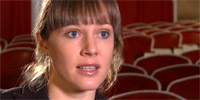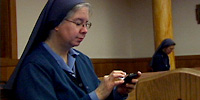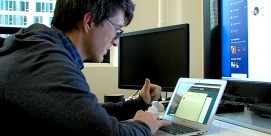SAUL GONZALEZ, correspondent: If you want to get a taste of the creative intensity and competitive spirit of the Bay Area tech scene, visit one of the many computer hackathons held annually in San Francisco and nearby Silicon Valley.
FEMALE HACKATHON PARTICIPANT: I'm on the very last API call and everything else is fine, all the data is populating, up until this point...
GONZALEZ: Hackathons are events where computer programmers, also called developers, gather to compete against each other to create new software from scratch.
MALE HACKATHON PARTICIPANT: Even if we could put that in bold, just so that we show the user exactly what they're getting out of it.
GONZALEZ: At this particular hackathon, 400 people, working in very tight spaces and fueled by soft drinks and sandwiches, have been given just 30 hours to create new apps for smartphones.
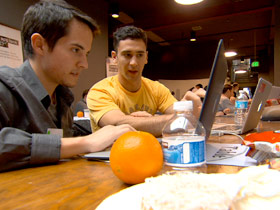
MALE HACKATHON PARTICIPANT: Once we have that, that will be the last piece of the puzzle.
GONZALEZ: Hackathons are also places where very smart and often very young people dream of quick success in Silicon Valley. That’s 17-year old Braun Shedd’s ambition.
BRAUN SHEDD: I want to have, at least in some form or fashion, my own company by the time I’m 20 that's successful, whatever that means.
GONZALEZ: You want to have a successful company by the time you’re 20?
SHEDD: Yeah, absolutely.
GONZALEZ: An event like this shows off the raw talent and ambition to be found in the Bay Area tech scene, a place where people always seem to be looking for fame, fortune, and the next new Facebook or Twitter.
But there’s another side to this place, a side where people try to balance the search for success with their values and religious convictions.
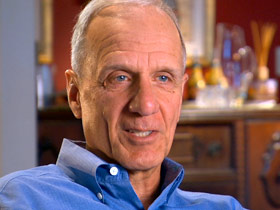
VINCE VACARELLO: Well, most people think of Silicon Valley as a place of high technology, innovation, wealth. And most people don’t think of it as a place of faith, but that is changing.
GONZALEZ: Vince Vaccarello has lived in Silicon Valley for 35 years, moving here in the 1970s to work at the company that developed the first computer spreadsheet. He says as Silicon Valley prospered, so did he, but he came to feel spiritually empty in the Valley's hard-charging business climate.
VACARELLO: I was beginning to be reasonably successful in Silicon Valley, but I found that that success was hollow. I felt there was more to life than just success. Of course, when you are busy, you don’t have time for things like faith or to think about what life is really about. You're just actively involved in developing products or marketing those products.
GONZALEZ: So Vaccarello began a blog for Christians in the tech industry titled “Finding God in Silicon Valley.”
Many who read Vacarello’s blog also attend regular Silicon Valley prayer breakfasts that he organizes. He says the breakfasts are one of the few places where religious tech executives can talk openly about their faith.
VACARELLO: There are a growing number of what I would call a new breed of Christian entrepreneurs that are building their businesses to glorify Christ.
GONZALEZ: One of the wealthiest and most powerful people of faith in Silicon Valley is Pat Gelsinger.
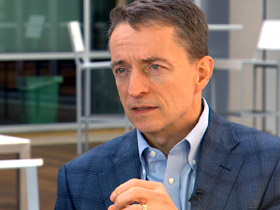
PAT GELSINGER: I think God created us to be inventors. He created us to have passion, to have dreams and visions, to push the envelope of invention and new creation.
GONZALEZ: Gelsinger is the CEO of VMware, a software development and data management company that earned more than $6 billion last year and employs over 18,000 people worldwide, 6,000 of them at VMware’s sprawling Palo Alto campus. Gelsinger describes his corporate leadership style in language that’s very unusual for a Silicon Valley tech mogul.
GELSINGER: If you can use Christian terms, I’m like the “minister of VMware,” and this is my church. And if you think about that, you know, some people might say, “Uh, what does that mean?” I say what do you expect your minister to do at your church? You expect them to be worried about the individuals. I’m worried about my individuals at VMware. They are worried about the success of their families. I’m worried about the success of my families. I am worried about the success of this organization, just like a minister would be at his church, and I really do see that those parallels are very significant.
GONZALEZ: Gelsinger says he doesn’t impose his faith on his employees, but it has led him and his wife to give away about half of their annual income to charity. But Gelsinger says that his religiosity doesn’t make him a pushover in business.
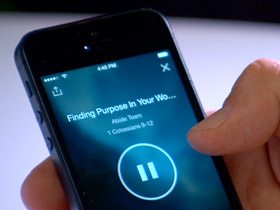
GELSINGER: Yeah, I am out to win versus our competitors in that regard. And there isn’t a person in the valley or a person inside of this company who doesn’t believe I have a deep passion to win in the marketplace. And I don’t think that’s anti-Christian.
GONZALEZ: Others are more directly trying to find fortune and success in Silicon Valley by marrying technology and faith such as those who work at the new start-up company Carpenters Code. It makes religiously-themed prayer apps for smartphones.
VOICE ON SMARTPHONE APP: This prayer time is an invitation to envision your future through prayer. We will ask God to reveal plans and purposes that he has for you.
GONZALEZ: What’s the business pitch behind the idea?
AHLSTEN: In this on-the-go lifestyle that we have today, people are seeking a way to connect with God and they just don’t have time and space to do it easily. And here you’ve got this phone that is always with you and is able to bring in these kind of experiences.
GONZALEZ: Neil Ahlsten, a former executive at Google, is Carpenters Code’s founder and CEO. He says he started the company out of a religious calling.
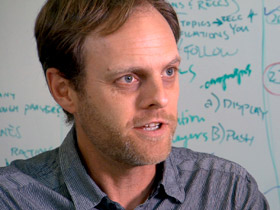
AHLSTEN: If we could actually build a digital experience that would help usher people into the presence of God, it has to exist. And if I don’t see anybody else building it, I’m probably going to have to go build it.
GONZALEZ: For some people God calls on them to do other things. For you, it’s to use technology to serve Him?
AHLSTEN: Yes. In this season of my life it is to use technology to serve Him.
GONZALEZ: Like countless other start-up companies in Silicon Valley, the small team at Carpenters Code work very long hours in a casual no-frills environment, one where the borders between work and home are blurred. Also like workers at other tech start-ups, they face the challenge of attracting investors. And in Silicon Valley, investors expect big returns for their money.
AHLSTEN: I can give my investors, probably, if we are successful, a 5x return on their investment—you invest one dollar, I will give you back five in 5 to 7 years. That model does not work for Silicon Valley investors. They are looking for a 100x, 500x returns.
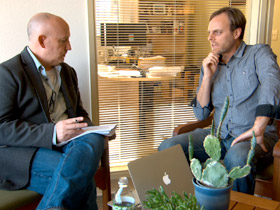
GONZALEZ: But Ahlsten says Carpenters Code religious tech products have also given it certain business advantages, attracting funders who otherwise would never have thought about investing in a Silicon Valley tech startup.
AHLSTEN: Funds have not come from here. I have talked to probably 75 people who are 8-or 9-figure types. It just doesn’t fit their investment thesis. Whose it does are high net worth Christians in the South, the Christian family foundations, and a lot of them have a very different perspective than the typical Silicon Valley investor. Their perspective is, "You have a phenomenal team, and I've never seen a team like this before trying to tackle this kind of a problem in a really interesting way, and you might make global impact in people’s lives in helping them connect with God. I’m in."
GONZALEZ: But Ahlsten, who’s married with a family, knows that he’s taken a very big and very personal risk founding this company, and that success isn’t assured.
(to Ahlsten): A lot of startups go away, a lot of startups fail. That is a possibility here?
AHLSTEN: Of course, from a personal perspective, I very much desire success in terms of just my own personal brand. I'm a human being who has an ego, who wants to go out and say, “Look at what I did for the world.” I'm just as human as everybody else is. And I would really feel stung by that if we failed, but I don’t think from a faith perspective it would change anything, because God never promised me business success in this venture. Never promised business success. He just said go do it. And so if the outcome isn’t the outcome I want, that doesn’t mean God wasn’t faithful; it just means it wasn’t the outcome I want.
GROUP PRAYING: Okay, let's go ahead...
GONZALEZ: In a scene that's very unusual in the Silicon Valley startup company, the staff of Carpenters Code gather regularly together to pray, appealing to a higher power for wisdom and success.
For Religion & Ethics NewsWeekly, I’m Saul Gonzalez in Silicon Valley.
AHLSTEN: (praying) We lift all this up and just ask for a blessing of peace in the world today, that your love may abound so fully that people are, hearts are transformed and changed. In Jesus' name we pray. Amen.

